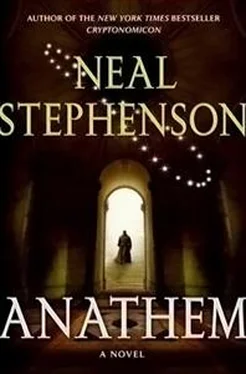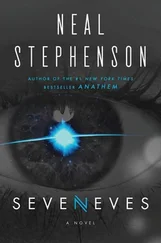“Believe me, it was not one for ink or even chalk.”
Fraa Corlandin, the FAE—First Among Equals—of the Order of the New Circle, had sat down across the table from me.
For the first nine and three-quarters years of my time at the Concent, he had ignored me, except in chalk hall where he was obliged to pay attention; lately he was acting as if we were friends. This was to be expected. With luck, thirty or forty new avout would be joining us at Apert. Even though they were not here yet, they seemed to surround us like ghosts, which made me seem older by contrast.
Not long after, if things went according to the usual pattern, the bells would signal the aut of Eliger, and all the Tenners would come together to watch me take a vow that would bind me to one order or another.
Eleven of my crop had been Collected—brought straight into the math from extramuros. The other twenty-one had joined the Unarian math first and spent at least a year under their Discipline before graduating to the Tenners; they tended to be a little bit older than us Collects. All Collection, and most graduation, happened during Apert. Though if a One-off showed exceptional promise, he or she could graduate early by passing through the labyrinth that connected the Unarian to the Decenarian math. But this had only happened three times while I’d been here. The full wiring diagram of how avout came here from extramuros and from small feeder maths in the region, and how they moved from one math to another, was complicated, and not really worth explaining. The upshot was that in order to maintain our nominal strength of three hundred, we Tenners would need to take in about forty new people at Apert. Some—we couldn’t know how many—would be graduating from the Unarian math. The balance would be made up by Collection, and by trolling through hospitals and shelters for abandoned newborns.
Once that was all done, I’d be facing a choice. Fraa Corlandin was sounding me out, perhaps even recruiting me, for the New Circle.
I had always been seen as a fid of Orolo and a few other Edharians who assisted him in his theorics. They spent whole days together in tiny chalk halls, and when they came out, I would go in and see their handwriting all tangled together on the slates—snarled skeins of equations and diagrams of which I understood perhaps one symbol in twenty. At this very moment, I was supposed to be working on a problem that Orolo had set for me: a photomnemonic tablet bearing an image of Saunt Tancred’s Nebula, from which I was supposed to answer certain questions about the formation of heavy nuclei in the cores of stars. Definitely not a New Circle kind of exercise. So why would the New Circle take it into their heads, now, that I might choose them at Eliger?
“Orolo is an impressive theorician,” Fraa Corlandin said. “I regret that I haven’t been suvined by him more.”
The flaw in this was obvious: odds were that Corlandin was going to spend sixty or seventy more years in the same math with Orolo. If he really meant what he said, why didn’t he simply pick up his stew-bowl and walk across the Refectory to Orolo’s table?
Fortunately my mouth was full of bread, and so I did not subject Fraa Corlandin to a withering blast of Thelenean analysis. Chewing my food gave me time to realize that he was just speaking polite nothings. Edharians never talked this way. Spending all my time around Edharians, I’d forgotten how to do it.
I tried to unlimber those parts of my mind that were used for polite conversation: probably a good thing to do anyway, on Apert eve. “I’m sure you could arrange to be suvined by Orolo, if you sat down near him and said something wrong.”
Fraa Corlandin chuckled at my joke. “I’m afraid I don’t know enough about the stars even to say something wrong.”
“Well, today for once he said something that wasn’t about stars.”
“That’s what I heard. Who could have guessed that our cosmographer was an enthusiast for dead languages?”
This entire sentence went by me—a little like when you are eating a slice of canned fruit and suddenly it slides down your throat before you’ve had a chance to chew it. Having finally got the hang of polite chitchat, I returned the favor of chuckling at his remark. But before I could really think about what he was saying, I noticed Lio and Jesry carrying their bowls to the kitchen. Two other fids stood, as though caught up in their wake, and followed them.
Following their glances, I noticed Grandsuur Tamura standing by the exit with her arms folded.
She reacted as if I had hit her with a spitball from across a crowded chalk hall, swiveling her head to strafe me with her eyes. I still had no idea what was going on, but I excused myself from Fraa Corlandin and carried my bowl into the kitchen. Seven of the other fids were there, hurriedly cleaning their bowls, but none of them knew any more than I did.
Incanter:A legendary figure, associated in the Sæcular mind with the mathic world, said to be able to alter physical reality by the incantation of certain coded words or phrases. The idea is traceable to work conducted in the mathic world prior to the Third Sack. It was wildly inflated in popular culture, where fictionalized Incanters (supposedly linked to Halikaarnian traditions) dueled their mortal foes, the Rhetors (supposedly linked to Procians), in more or less spectacular style. An influential suvin among historical scholars holds that the inability of many Sæculars to distinguish between such entertainments and reality was largely responsible for the Third Sack.
— THE DICTIONARY, 4th edition, A.R. 3000
A few minutes later, all thirty-two fids and Grandsuur Tamura were together in Saunt Grod’s chalk hall, which was normally considered to hold eighteen. “Shall we move over to Saunt Venster where there’s more room?” suggested Suur Ala. She was the self-appointed boss of the bell-ringing team—and of everyone else in range of her searchlight eyes. Behind Ala’s back, people liked to say that, of all the current crop of fids, she was the most likely to end up being Warden Regulant.
Grandsuur Tamura pretended not to hear. She had lived here seventy-five years and well knew the sizes of the available halls. She must have chosen this one for a reason—probably, I realized, because no one could hide ignorance, or boredom, when we were packed in so tightly. There wasn’t room to make our spheres into stools, and so we kept them pilled up and tucked inside our bolts.
I noticed that some of the suurs were standing even closer together than was strictly necessary, and sniffling into one another’s shoulders. One of them was Tulia, whom I liked quite a bit. I was eighteen. Tulia was a bit younger. Lately I had dreamed of having a liaison with her once she had come of age. In general I looked at her more often than was strictly necessary. Sometimes she looked back. But when I tried to meet her eye now, she pointedly looked away, and fixed her red and swollen eyes on the big stained-glass window above the slate. Since (a) it was dark outside and (b) the window depicted Saunt Grod and his research assistants being beaten with rubber hoses in the dungeons of some Praxic Age spy bureau and (c) Tulia had already spent something like a quarter of her life in this room, I reckoned that inspecting the window wasn’t really the point.
Dense though I am, I finally put it together that this was the last time that our crop of thirty-two fids would be gathered together, as such, in our lives. The girls with their preternatural ability for noticing such things were responding, the boys with our equally uncanny obtuseness were only affected inasmuch as the girls we fancied were crying.
Grandsuur Tamura was not doing this to be sentimental, though. “Our topic is the Iconographies and their origins,” she announced. “If I am satisfied that you know enough and that you understand the importance of what you know, then you shall be free to roam about extramuros during the ten days of Apert. Otherwise, you shall remain in the Cloister for your own safety. Fid Erasmas, what are the Iconographies and why do we concern ourselves with them?”
Читать дальше





